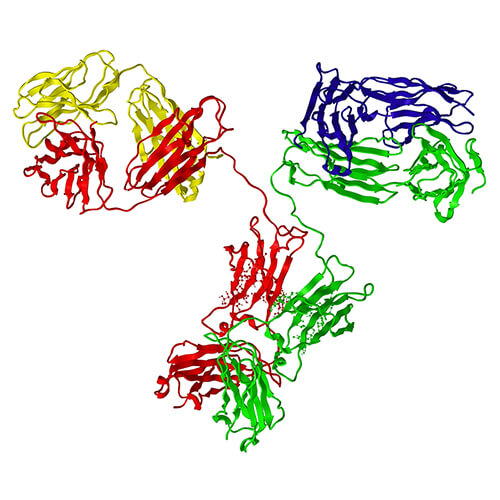Apolipoprotein-B (ApoB) is a protein, involved in the metabolism of lipids and is the main protein constituent of lipoproteins such as very low-density lipoprotein (VLDL) and low-density lipoprotein (LDL). ApoB exists in the plasma in two main iso forms. ApoB100 and ApoB48. ApoB100 is synthesised in the liver, and is the major apolipoprotein of VLDL, intermediate density, and LDL, and is absolutely required for their formation. ApoB100 acts as a ligand for LDL receptors in various cells throughout the body, allowing cells to internalise LDL and absorb cholesterol. ApoB48 is expressed in the intestine and is present on chylomicrons and their remnants lacking the C-terminal, LDL-receptor binding region of ApoB100. Elevated plasma concentrations of ApoB containing lipoproteins, are key risk factors for the development of atherosclerosis. Anti-Human ApoB is used for the detection of elevated levels of ApoB in the patient serum which may indicate the high risk of developing cardiac diseases. It also is used in the development and manufacturing of various qualitative and quantitative assays based on RID, IEP, ELISA, latex enhanced immunoturbidimetric assays, ouchterlony double diffusion, western blot, and precipitin assays.
Anti-Human Apolipoprotein B
Product Code : 00-ABD-MM-APB-001
Available products:
| Product Name (New) | Product Code | Grade |
|---|---|---|
| Goat Anti-Human Apolipoprotein B, Whole Serum | 00-ABD-MM-APB-001 | Whole Serum |
Specifications:
| Test Parameters | Acceptance Criteria |
|---|---|
| Product Code | 00-ABD-MM-APB-001 |
| Host | Goat |
| Immunogen | Human ApoB |
| Grade | Whole Serum |
| Physical Appearance | Straw to brownish yellow clear liquid without any suspended particles |
| Titre (Reverse Single Radial Immunodiffusion) | > 8 mg/ml |
| Shelf life | 3 years |
| Buffer details* | Tris Saline with 15mM NaN3, pH 7.4 ± 0.2 |
| Total Protein (Biuret method) | 70 to 160 mg/ml |
| Cholesterol (CHOD Enzymatic Method) | ≤ 50 mg/dl |
| Specificity (Immunoelectrophoresis) | Monospecific to human Apolipoprotein B when reacted with pooled human plasma & 2X normal human serum |
| Specificity (Ouchterlony) | Monospecific when reacted with normal human serum |
| pH | 7.0 to 8.0 |
| Storage conditions | 2 to 8 ºC |
For research use or further manufacturing purposes only
